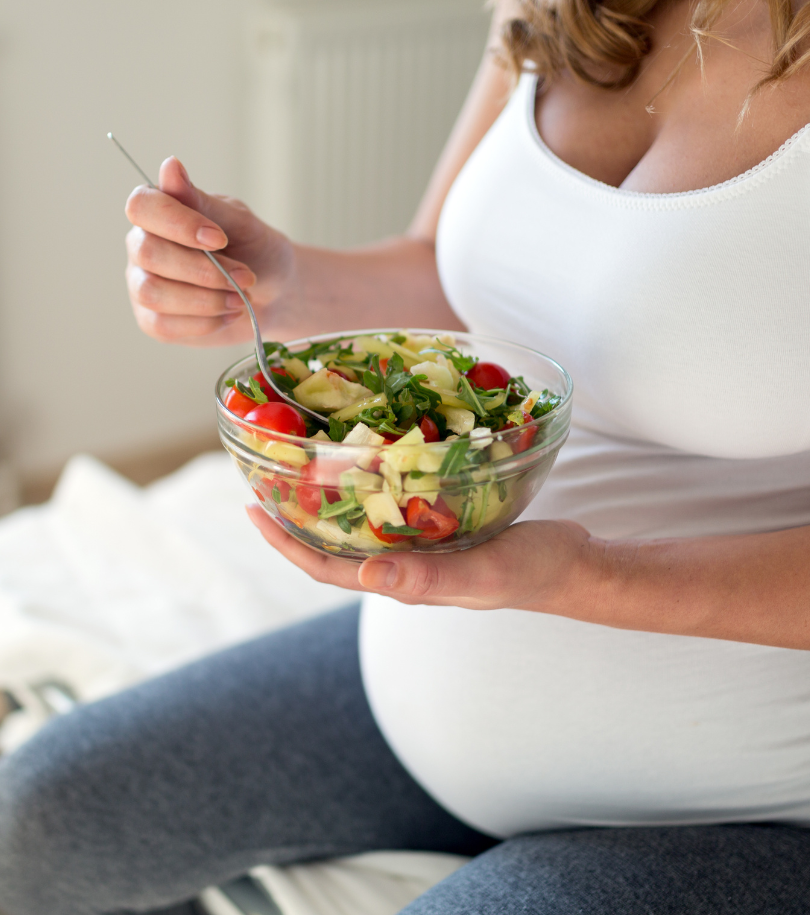- Home
- Health Topics
- Food and Nutrition
- Nutrition Throughout the Lifecycle
Nutrition Throughout the Lifecycle

On this page
Pregnancy
Following Canada’s food guide can help you meet your nutritional needs during pregnancy. Eating well means eating a variety of foods that you enjoy each day and incorporating vegetables and fruits, whole grain foods and protein foods at each meal. In your second and third trimesters, aim to have an additional snack or small meal to support the needs of your growing baby.
If you are pregnant or could become pregnant, take a multivitamin daily containing 0.4 mg of folic acid and 16-20 mg of Iron. Speak to a healthcare professional to help you find the multivitamin right for you.
For additional information on eating during pregnancy, visit:
To speak to a Registered Dietitian for free, call 8-1-1 or start a chat.

0-6 months
Breastmilk provides everything your baby needs for the first six months of life. For more information on feeding your baby, visit the infant feeding page of our website.
Health Canada recommends a daily vitamin D supplement of 400 IU (International Units) for all breastfed or partially breastfed babies from birth until two years of age. You can buy vitamin D drops at a drugstore and some grocery stores without a prescription. Follow the instructions on the label.
To speak to a Registered Dietitian for free, call 8-1-1 or start a chat.
For additional information, including local resources, visit Nutrition Resources

6 Months – 1 Year
Introduction of Solid Foods
At around 6 months of age, your baby will start to show signs that they are ready to eat.
Look for these signs before starting solid foods:
- Has good control of their head when sitting
- Can sit up in a high chair and lean forward
- Opens mouth wide when you offer food
- They can pick up food and bring it to their mouth.
- They can show signs of being full, such as turning their face away.
At around 6 months, your baby’s iron stores are low and iron is needed from food. First foods should be iron-rich, such as iron fortified cereals, meats, fish, lentils and tofu.
For additional information on introducing solid foods:
- Nutrition Connections: Feeding Your Baby: A guide to introducing solid foods
- Food Allergy Canada for advice on introducing food allergens
To speak to a Registered Dietitian for free, call 8-1-1 or start a chat.
For additional information, including local resources, visit Nutrition Resources

Toddler / Preschooler
A positive relationship with food starts early in life. How you approach mealtimes with your toddler and preschooler is as important as what foods you offer. Eating is a skill that takes time to learn.
As a parent/caregiver, you decide:
- What foods to offer
- When to offer meals and snacks, and
- Where your child will eat
Your child will decide:
- Which foods to eat, and
- How much to eat
For additional information on feeding toddlers and preschoolers:
- Trust Me. Trust My Tummy.
- Picky Eating
- Feeding a Sick Child
To speak to a Registered Dietitian for free, call 8-1-1 or start a chat.
For additional information, including local resources, visit Nutrition Resources

School-Aged
Food helps support your child’s growth and development and gives them the energy to learn and play.
For additional information on packing school lunches:
- Balanced School Lunch Ideas
- Peanut and Tree Nut Aware Lunches and Snacks (PDF)
- Unlock Food: Simple lunch solutions
For additional information on supporting your learning eater:
- Nurturing Eaters in Elementary Schools
- Canada’s Food Guide – Tips for Eating Well
- Safe Food Handling for Children Under 5
To speak to a Registered Dietitian for free, call 8-1-1 or start a chat.
For additional information, including local resources, visit Nutrition Resources

Adult
Food and nutrition play an important role in maintaining your health and well-being and lowering your risk of chronic disease.
After the age of 50, Health Canada recommends taking a vitamin D supplement every day that contains 400IU (10ug) of vitamin D.
For more information on nutrition for adults:
- Canada’s food guide: Healthy eating for adults
To speak to a Registered Dietitian for free, call 8-1-1 or start a chat.

Older Adults
As we age, changes in our health and lifestyle are possible. Continuing to eat well is important as we journey through life.
After the age of 50, Health Canada recommends taking a vitamin D supplement every day that contains 400IU (10ug) of vitamin D.
For more information on nutrition for older adults:
- Canada’s food guide: Health eating for seniors
To speak to a Registered Dietitian for free, call 8-1-1 or start a chat.

